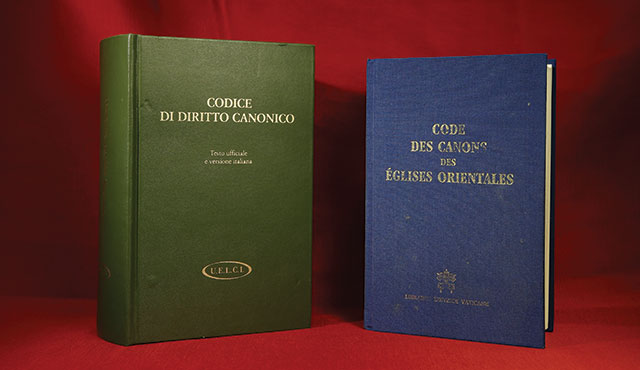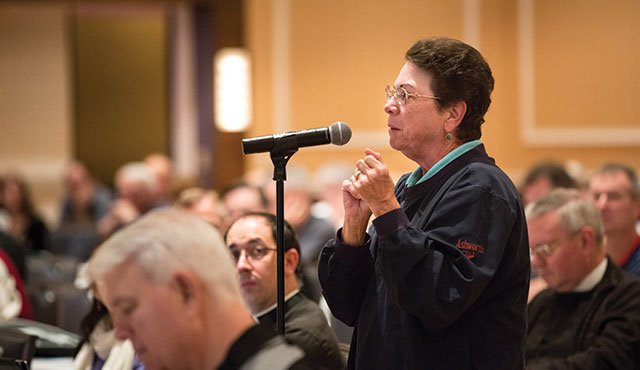When Catholic scholars speak of canon law, they are speaking about an entire legal system that guides and governs the Church. Developed across thousands of years, it is a judicial cloak that covers Catholics from birth to burial.
“Basically it’s the law that governs the Church in regards to the sacraments, to the teaching function of the Church, to penal processes, and much more,” said Msgr. Stephen Doktorczyk, vicar general for the Diocese of Orange.
That said, when the Catholic populace speaks of canon law, it’s usually about one thing: annulment. Properly referred to as nullity of marriage, it is the Church’s way of handling broken unions and is a vital and serious function.
Each year, the diocese investigates about 250 formal petitions of nullity presented by Catholics and non-Catholics alike… These cases are formally adjudicated before a three-judge tribunal within the Office of Canonical Services.
According to Doktorczyk, it is required that every diocese has at least one priest who is a judicial vicar and qualified to handle cases of marriage nullity.
As the seventh-largest diocese in the country, the Diocese of Orange has a much larger operation, with judicial vicar Fr. Scott Borgman, full-time and part-time priests as vicars and “defenders of the bond,” full-time judges (English, Vietnamese and Spanish speakers), clerics, lay staff and volunteers.
Although civil society now allows simple divorces, from no-fault declarations of “irreconcilable differences,” the Church considers that marriages are sacred and not undertaken lightly.
Borgman notes that divorce is a civil proceeding that has no effect on what the Church considers the sanctity of marriage.
He says that marriage is a sacrament, a covenant with God. And if the marriage is valid in the eyes of the Church it cannot be “put asunder.”
But divorces are a fact of modern life. And although it has no bearing on a Catholic marriage, the faithful do have recourse. The nullity of a marriage is a determination that the marriage was invalid to begin with.
It takes a little mental gymnastics, but as Cardinal Francesco Coccopalmerio, the now retired president of the Pontifical Council for Legislative Texts, explained in a press conference, the Church does not decree the “annulment” of a legally valid marriage, but rather declares the “nullity” of a legally invalid marriage.
Sometimes the process is simple, as when a Catholic marries a non-Catholic without petition or permission. Beyond that, it can become more complex and serious.
“A marriage is considered valid until proved otherwise,” Doktorczyk said.
It requires no small amount of introspection, because the grounds for the decision can seem dire. They include “grave lack of discretion or judgment,” deceit and fraud, or failure to understand the “sacramental dignity of marriage.”
Because nullity of marriage is a legal matter to Catholics, it includes interviews with the judge, witnesses and statements, documentation and the tribunal decision.
Cases can sometimes take months to resolve, especially if both parties are not committed to the process or available. Sometimes certain documents are unavailable, particularly if they originate from another country.
Doktorczyk recognizes the process may seem cumbersome and intrusive to some, particularly non-Catholics, but adds: “This is judicial. It’s for the public good.”
Borgman says that a majority of nullity cases are approved by the church. A petitioner can appeal an adverse decision to another diocese and even appeal to Rome.
Because of the difficulty, Borgman says most parishioners often don’t pursue nullity cases unless they want to remarry or be free to remarry in the Church.
While a divorced person can receive communion and participate in the life of the Church, one who remarries invalidly cannot receive communion or be fully involved in the Church.
Doktorczyk said that while other Christian denominations may allow parishioners to divorce multiple times and participate in the church, Catholics hold more literally to the words of Jesus Christ that “Whoever divorces his wife and marries another, commits adultery.”
“Catholics are the only ones holding to that,” Doktorczyk said.
Despite the seriousness with which the Catholic Church handles nullity of marriage, Pope Francis has loosened and streamlined some of the more stringent requirements.
In certain cases, a bishop can grant a nullity request without a full court case. That has yet to happen in Orange County, but it remains an option, particularly because Bishop Kevin Vann possesses a doctorate in Canon Law from the Angelicum University in Rome.
The Pope also eliminated the need for every case to be reviewed and confirmed by a second diocese. In Orange County, this has taken several hundred reviews annually from other tribunals off its docket.
Priests say the best way to avoid the pain of nullity and divorce are to carefully reflect, pray and prepare for marriage ahead of time and take advantage of numerous services offered by the Office of Pastoral Care.
For all the pain and anguish that can come from the loss of a marriage, Borgman says some good can come from the nullity process.
“I find it can be an incredible time of healing,” he said. “Allow the church to help in the healing process.”


